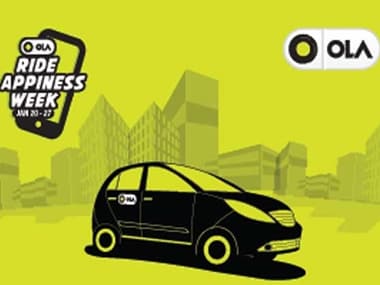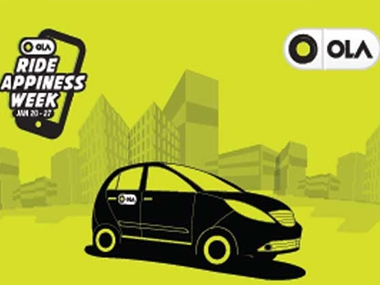The buzz about surge pricing can be heard almost everywhere. Suddenly, you hear ardent defenders of the surge pricing principle. At the same time, there is no dearth of people who are totally against it. The Delhi government has banned surge pricing altogether, and has even hauled up drivers and impounded vehicles that have tried to charge customers a higher price during peak hours. [caption id=“attachment_2198842” align=“alignleft” width=“380”]  Ola Cabs[/caption] The Director General of Civil Aviation (DGCA) has reportedly sent out a notice to private airlines asking them to explain the logic adopted behind their respective surge pricing policies. Cab companies like Ola and Uber protest. Respect free markets, they argue. After all, if the demand is great, and the supply of cabs is inadequate to meet the demand, surge pricing is the best way to regulate demand, they add. Airline companies are not far behind. Remember, they were the first to adopt surge pricing. When the demand is great they increase fares. Customers who were used to the flat tariff structure of Air India and Indian Airlines, were aghast. And now the DGCA has woken up to find a solution to this issue. So is surge pricing right? Remember, there is a kind of surge pricing implicit behind the tatkal ticket booking introduced by the railways. Ditto with passport applications. But in both these cases the surge amount is defined. It is not left to “market forces”. Before we go to whether free-market pricing is right or not, it is worth remembering that all the services referred to above are licensed sectors. These services are not ‘open’ to anyone who wants to drive a car and call it a cab, or to fly a plane and pick passengers up. The railways is a monopoly of the government. And issuing passports is also a monopoly. Essentially, they ate all regulated businesses. Regulated businesses are set up under a set of rules. Therefore, the first question is, has surge pricing been allowed under the licensing rules? If not, shouldn’t a formal process of obtaining clearances be necessary first? If yes, has the government laid out the norms under which this flexible pricing is to be permitted? Curiously, there are no policy explanations coming forth from the government itself – be it the central government or state governments. After all, don’t policy-makers realise that free markets and the rules of free market pricing can be talked about only if there is freedom for players to come into the sector and move out as they please. If the first freedom is not there, the second freedom does become illegitimate. There is a second problem when there is only a limited number of licensed players. When the number of players in any market remains limited, their ability to rig the market, and collude to increase or reduce supply, is tremendous. Licensed markets tend to be natural monopolies. Hence the need to regulate them becomes all the more imperative. This includes service standards and pricing. Just imagine the outrage customers exhibit when the conventional (kaali-peeli) taxi driver decides to charge a higher tariff during days when there is a downpour, or when the train services go for a toss. His attempt to charge more was nothing short of surge pricing. Ditto, when the grain merchant decided to charge a premium over grain, or kerosene when there is a shortage. Yet when they charge more, it is extortion. It is illegal. So, what makes the pricing policies of Ola and Uber, or the private airlines legal? This is when we have to consider the “The Moral Limits of Markets” – a talk delivered by Michael Sanders, a Harvard professor (Watch here). He spoke on very topic at a public forum in Mumbai too in March 2012. He talks about public services, and the need to ensure that they do not become exploitative. He dwells on the moral issues behind any kind of pricing – a subject that India’s policymakers should pay close attention to. Yet there is no denying that there should be an element of market competition as well. One good way to have both is to fix a cap on the price per km or on the premiums that service providers can charge. That way, the maximum tariff that cabs can charge is determined through a regulation. This could apply to electricity and water tariffs as well. Depending on the need of both the customer and the driver (the driver may want to close for the day, and wants a passenger going his way), the tariff can be lowered. If the state wants to encourage customers to use electricity during non-peak hours, it can offer power at a discount – under a policy known as time-of-day (TOD) tariffs. But at no times must the charges be higher than the ceiling. This is what the telecom industry had to face, when Pramod Mahajan, the then telecom minister, mandated a ceiling of Rs.1 per minute of calling time on mobile phones. Incoming calls were kept free. Immediately, telecom companies that had been charging between Rs.4 and Rs.10 a minute, dropped tariffs and even began making money. They learnt to trim costs and also make profits in other ways – value-added-services was a brilliant strategy. The trouble with India’s legislators is that they have not crafted an omnibus law for public services or public utilities, the way the US has. Thus, each service has to draft out a set of rules. The omnibus legislation actually lists out the things that a regulator must include in his licence to a service provider. It talks about how a customer’s interests must be protected. In the case of the cabs and airlines, the ceiling on tariffs has not be specified. And the surge pricing problem has emerged because of this legislative lacuna. Eventually, both businesses and customers have to bear the brunt of this non-application of mind on the part of the policy-makers. This could have been deliberate, or could have been an oversight. But the sooner this is addressed, the better it will be for everyone.
The trouble with India’s legislators is that they have not crafted an omnibus law for public services or public utilities, the way the US has
Advertisement
End of Article


)

)
)
)
)
)
)
)
)



